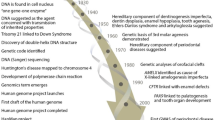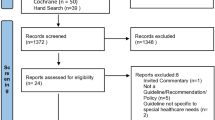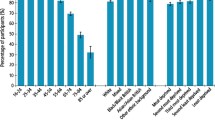Abstract
Genomic medicine is on the threshold of a significant advance in the United Kingdom (UK) with the introduction of a National Health Service (NHS) Genomic Medicine Service. This world-leading initiative aims to integrate genomic medicine into routine NHS care and has the potential to revolutionise healthcare in the UK, including dentistry. The initial focus will be on increasing diagnostic services for rare diseases and cancer, while also harnessing the use of personalised medicine for therapeutic interventions in multiple disorders. Here, we provide a brief overview of this new service, outlining the historical background that has led to its development and how it will work, as well as discussing some of the wider implications for healthcare within the NHS and highlighting the potential longer-term impact of genomics for oral health.
Key points
-
Includes information about the new NHS Genomic Medicine Service.
-
Discusses the implications of this service for healthcare.
-
Includes information on how this service might impact on dentistry.
This is a preview of subscription content, access via your institution
Access options
Subscribe to this journal
Receive 24 print issues and online access
$259.00 per year
only $10.79 per issue
Buy this article
- Purchase on Springer Link
- Instant access to full article PDF
Prices may be subject to local taxes which are calculated during checkout

Similar content being viewed by others
References
Lander E S, Linton L M, Birren B et al. Initial sequencing and analysis of the human genome. Nature 2001; 409: 860-921.
Venter J C, Adams M D, Myers E W et al. The sequence of the human genome. Science 2001; 291: 1304-1351.
Lander E S. Initial impact of the sequencing of the human genome. Nature 2011; 470: 187-197.
Green E D, Guyer M S, National Human Genome Research Institute. Charting a course for genomic medicine from base pairs to bedside. Nature 2011; 470: 204-213.
Caulfield M J, Davies J, Dennys M et al. The 100,000 Genomes Project Protocol. 2017. Available at https://www.genomicsengland.co.uk/wp-content/uploads/2017/03/GenomicEnglandProtocol_151117-v4-Wales.pdf (accessed October 2020).
Turnbull C, Scott R H, Thomas E et al. The 100,000 Genomes Project: bringing whole genome sequencing to the NHS. BMJ 2018; 361: k1687.
Davies S C. Annual Report of the Chief Medical Officer 2016: Generation Genome. 2016. Available online at https://www.gov.uk/government/publications/chief-medical-officer-annual-report-2016-generation-genome (accessed May 2020).
Wright C F, FitzPatrick D R, Firth H V. Paediatric genomics: diagnosing rare disease in children. Nat Rev Genet 2018; 19: 253-268.
Vockley J G, Niederhuber J E. Diagnosis and treatment of cancer using genomics. BMJ 2015; 350: h1832.
LiWanPo A. Pharmacogenetics begins to deliver on its promises. BMJ 2015; 351: h5042.
Academy of Medical Royal Colleges. Genomic Medicine in the NHS. 2019. Available at https://www.aomrc.org.uk/wp-content/uploads/2019/03/2019-03-07_Genomic_medicine_in_the_NHS.pdf (accessed May 2020).
Genomics Education Programme. HEE Genomics Education Programme. Available online at http://www.genomicseducation.hee.nhs.uk/ (accessed May 2020).
Cobourne M T, Sharpe P T. Diseases of the tooth: the genetic and molecular basis of inherited anomalies affecting the dentition. Wiley Interdiscip Rev Dev Biol 2013; 2: 183-212.
NHS. National Genomic Test Directory: Testing Criteria for Rare and Inherited Disease. 2019. Available at https://www.england.nhs.uk/wp-content/uploads/2018/08/rare-and-inherited-disease-eligibility-criteria-march-19.pdf (accessed May 2020).
McDowall F, Kenny K, Mighell A J, Balmer R C. Genetic testing for amelogenesis imperfecta: knowledge and attitudes of paediatric dentists. Br Dent J 2018; 225: 335-339.
Xie H, Xue L, Hua W, Jia B, Zhang L, Li L. Whole genome sequencing and 6year follow-up of a mother and daughter with frontometaphyseal dysplasia associated with keratitis, xerosis, poikiloderma, and acro-osteolysis: A case report. Medicine (Baltimore) 2018; DOI: 10.1097/MD.0000000000011283.
Harel T, Griffin J N, Arbogast T et al. Loss of function mutations in CCDC32 cause a congenital syndrome characterized by craniofacial, cardiac and neurodevelopmental anomalies. Hum Mol Genet 2020; 29: 1489-1497.
Divaris K. The Era of the Genome and Dental Medicine. J Dent Res 2019; 98: 949-955.
Taylor J C, Martin H C, Lise S et al. Factors influencing success of clinical genome sequencing across a broad spectrum of disorders. Nat Genet 2015; 47: 717-726.
Deciphering Developmental Disorders Study. Large-scale discovery of novel genetic causes of developmental disorders. Nature 2015; 519: 223-228.
Nibali L, Di Iorio A, Tu Y K, Vieira A R. Host genetics role in the pathogenesis of periodontal disease and caries. J Clin Periodontol 2017; 44 Suppl 18: S52-S78.
Schaefer A S. Genetics of periodontitis: Discovery, biology, and clinical impact. Periodontol 2000 2018; 78: 162-173.
Vieira A R, Albandar J M. Role of genetic factors in the pathogenesis of aggressive periodontitis. Periodontol 2000 2014; 65: 92-106.
Vieira A R, Modesto A, Marazita M L. Caries: review of human genetics research. Caries Res 2014; 48: 491-506.
Munz M, Willenborg C, Richter G M et al. A genome-wide association study identifies nucleotide variants at SIGLEC5 and DEFA1A3 as risk loci for periodontitis. Hum Mol Genet 2018; 27: 941-942.
Sanders A E, Sofer T, Wong Q et al. Chronic Periodontitis Genome-wide Association Study in the Hispanic Community Health Study/Study of Latinos. J Dent Res 2017; 96: 64-72.
Sudo T, Okada Y, Ozaki K et al. Association of NOD2 Mutations with Aggressive Periodontitis. J Dent Res 2017; 96: 1100-1105.
Kilian M, Chapple I L, Hannig M et al. The oral microbiome - an update for oral healthcare professionals. Br Dent J 2016; 221: 657-666.
Beck J D, Philips K, Moss K, Divaris K, Morelli T, Offenbacher S. Advances in precision oral health. Periodontol 2000 2020; 82: 268-285.
Morelli T, Agler C S, Divaris K. Genomics of periodontal disease and tooth morbidity. Periodontol 2000 2020; 82: 143-156.
Kondo S, Schutte B C, Richardson R J et al. Mutations in IRF6 cause Van der Woude and popliteal pterygium syndromes. Nat Genet 2002; 32: 285-289.
Park J W, McIntosh I, Hetmanski J B et al. Association between IRF6 and nonsyndromic cleft lip with or without cleft palate in four populations. Genet Med 2007; 9: 219-227.
Vieira A R, Modesto A, Meira R, Barbosa A R, Lidral A C, Murray J C. Interferon regulatory factor 6 (IRF6) and fibroblast growth factor receptor 1 (FGFR1) contribute to human tooth agenesis. Am J Med Genet A 2007; 143A: 538-545.
Jumlongras D, Bei M, Stimson J M et al. A nonsense mutation in MSX1 causes Witkop syndrome. Am J Hum Genet 2001; 69: 67-74.
Lidral A C, Romitti P A, Basart A M et al. Association of MSX1 and TGFB3 with nonsyndromic clefting in humans. Am J Hum Genet 1998; 63: 557-568.
Vastardis H, Karimbux N, Guthua S W, Seidman J G, Seidman C E. A human MSX1 homeodomain missense mutation causes selective tooth agenesis. Nat Genet 1996; 13: 417-421.
Yu M, Liu Y, Liu H et al. Distinct impacts of bi-allelic WNT10A mutations on the permanent and primary dentitions in odontoonychodermal dysplasia. Am J Med Genet A 2019; 179: 57-64.
van den Boogaard M J, Creton M, Bronkhorst Y et al. Mutations in WNT10A are present in more than half of isolated hypodontia cases. J Med Genet 2012; 49: 327-331.
Author information
Authors and Affiliations
Corresponding author
Ethics declarations
MTC and AS represent the Faculty of Dental Surgery at the Royal College of Surgeons of England and the Genomics Education Programme at Health Education England, respectively on the Academy of Medical Royal Colleges Genomic Clinical Champions Group. The remit of this group is to oversee the work related to championing and supporting the NHS in embedding the use of genomic medicine into clinical practice. This will help to ensure that the NHS is prepared to harness the full potential of genomics across all clinical specialities. The main role of the group is to ensure the work meets its objectives, and to provide guidance and advice on current and future work.
Rights and permissions
About this article
Cite this article
Cobourne, M., Irving, M. & Seller, A. Welcome to the new genomics: an introduction to the NHS Genomic Medicine Service for oral healthcare professionals. Br Dent J 229, 682–686 (2020). https://doi.org/10.1038/s41415-020-2348-2
Received:
Accepted:
Published:
Issue Date:
DOI: https://doi.org/10.1038/s41415-020-2348-2



